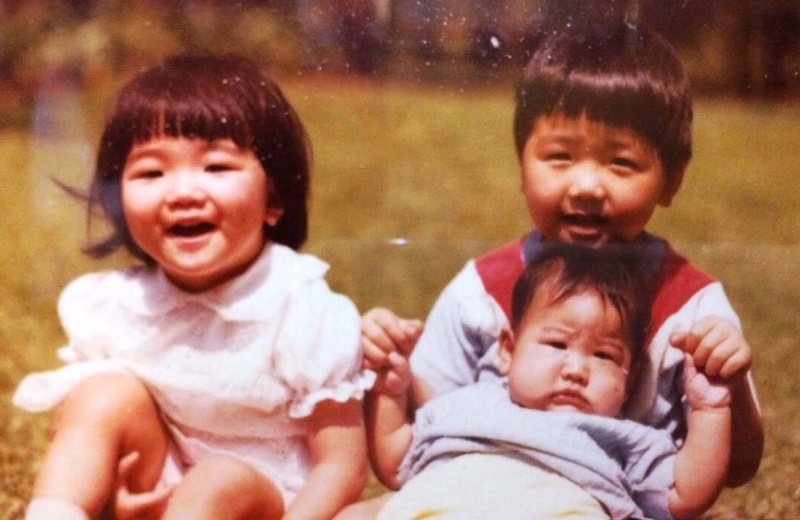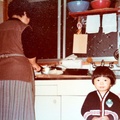To the three children
Hello how are you?
You three were born in America and live a multilingual life, speaking English outside the home and Japanese at home. Since you started attending local schools, you have become very good at English, and I want you to think that speaking in English is easy, but I don't want you to think that speaking, listening, writing, reading, and thinking in Japanese is a hassle. Your father also lived in Mexico as a child, so he lived a life where he spoke Spanish outside the home and Japanese at home.
Today, I would like to share with you my experiences from my childhood to the present, and I hope that you will come to understand that multilingualism is fascinating.
As I said before, your father was born in Mexico and lived there until he graduated from high school. Your Mexican grandmother, your father's mother, always tells him a story. When your father was little, she would say the following to her Mexican friends to help them learn Japanese.
"Adepta, idepero, udekoneho."
Do you know what I mean?
"Oh, a department store? Ide pero? Arm kneading sail?"
Still, this doesn't make sense. Let's translate this sentence into Spanish.
“A” of pain, “I” of perro, “U” of conejo.
It's easier to understand if you think of the part after "de" in the first Japanese sentence as Spanish. But this still doesn't make sense as a sentence, does it? So, next I'll give an explanation.
"A" by Pato (Pato = duck = Ahiru), "I" by Perro (Perro = dog = Inu), "U" by Conejo (Conejo = rabbit = Usagui)
Did you understand? Your grandmother happily tells the story as if it were yesterday about how, when she was little, her father would mix Japanese and Spanish as above in order to teach his Spanish-speaking friends Japanese. She also tells us that when she was little, her father would say things like this:
"Mom! I'm going to climb these stairs now!"
Do you know what I mean?
To stand out? To stake out a spot? To mark a territory? On the stairs?
Just like before, if you mix it with Spanish, it will become easier to understand.
"Mom! I'm going down these stairs from Bajar now!"
Did you get it? When my father was little, he would conjugate the Spanish verb "bajar" (to go down) in the same way he does in Japanese when he talked to your grandmother.
It seems that your father recognized that all Spanish verbs before they are conjugated end in "R," and that all Japanese verbs before they are conjugated end in "ru" as a commonality.
Let me give you another example.
The Spanish word for "eat" is "Comer", but if you write it in katakana, it becomes "comeru", and when pronounced, it sounds like "komeru". Conversely, if you write "eat" in a Spanish-like way, it becomes "Taber". Based on this, I made the following sentence.
Dad is going to load this bullet now. (No, I'm not going to load the bullet, I'm going to comer it.)
Do you want to eat pizza at a restaurant? (But is that a coincidence that we eat and where can we eat pizza?)
If you understand both Japanese and Spanish, I think you will enjoy the humor and humor of these two sentences. You can also have fun playing with words by listening to Japanese place names and words in Spanish, or vice versa. Here are some examples:
Shinjuku → Sin Juku
Sin is used when you want to say "there is no such thing." I don't know what Juku is, but to a Spanish ear, Shinjuku means a place without Juku. If you know the origin of the name Shinjuku in Japanese, your dad thinks it's funny how the meaning becomes contradictory when you translate it into Spanish.
Akita → Aqui'ta
Aqui means "here" in the sense of this place. 'ta sounds like a contraction of the second or third person present tense of the verb estar, "to be," so although I don't know who Aqui'ta is, I can tell that she is here. The person in Akita must be beautiful.
Queretaro → Kick, Taro
It's interesting that when you hear the name of a town in Mexico famous for its aqueduct with a Japanese ear, it suddenly sounds like the conversation of young soccer boys.
Otorrinolaringólogo → Decoy stray apple logo
This is how ENT is written in Spanish, but when I heard it with Japanese ears, it sounded like a decoy wild apple logo, and I got confused thinking, what would a decoy wild apple logo be?
Many of these word games are just puns or images of fun scenes, but I think that the accumulation of these experiences has made your father feel that living in a multilingual environment is fun. I don't think that your father understood everything I'm writing about in this letter from his childhood, but I have no doubt that your grandparents raised him from an early age to not feel uncomfortable with either language.
So I hope that you three, including your dad, will find ways to enjoy yourselves through your multilingual life in both English and Japanese. Next time, let's try to find Japanese words that sound like English, and English words that sound like Japanese.
From Dad
© 2016 Toshiro Obara





